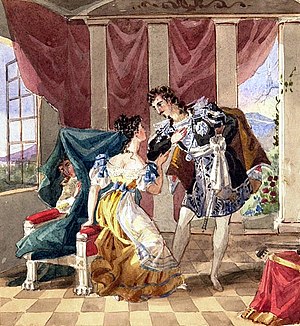The Marriage of Figaro

by Wolfgang Mozart
“Let all be forgiven. Let all hearts proclaim the healing power of love!”
Mozart’s magnificent opera is rich with humanity, humor, and stratagems. Every subtle nuance can be enjoyed in this dramatic and witty English performing translation!
Excerpt:
Act II, #10, Countess: “Porgi amor…“
"God above, hear my prayer. Ease my pain and grant me peace. Oh, return the love I've cherished, or give my aching heart release. Oh, please let this torment cease! Tell me why his love has faded. Let me know in what way I can win back the man I married. God of love, heed my cry. If my love is lost forever, then take pity and let me die."
Copyright Kenneth Jakobs 1990, 2002
All rights reserved
Notes
My English performing translation of The Marriage of Figaro is available in three distinct versions: a full-length version containing all the numbers and recitatives, an abbreviated four-act version, and a slightly shorter abbreviated three-act version.
When I have produced or directed this opera myself, I have always opted for the abbreviated versions. My single most important consideration in creating this translation was that it be unflaggingly entertaining. Uncut, the opera is over four hours long with intermissions. I felt that contemporary audiences would prefer it somewhat shorter and have therefore cut it judiciously. While this necessarily sacrificed some fine music, I believe that what remains contains the heart and soul of the piece, and that audiences are more likely to be constantly engaged, and with us in body and spirit for the exquisite and touching final scene.
However, I understand that directors like to do their own evaluations and decide for themselves which material to include. So, I am now offering a full version of the opera with all numbers and complete recits (with the exception only of #25, Basilio’s aria, which is never staged).
In all versions, I wished to underscore the opera’s social and political origins. In addition to being a rich comedy, full of memorable characters, human foibles, mistaken identities, and love thwarted and requited, at the core of the opera is an incisive drama which satirizes the class system that persisted in Europe well into the so-called Age of Enlightenment. From our modern perspective this was a system that was rife with exploitation and the abuse of power, especially the exploitation of the lower classes by the upper, and of women by men. Mozart’s and librettist da Ponte’s source material for Figaro was Beaumarchais’ incendiary Le Mariage de Figaro, written in 1778, suppressed until 1784. This play dared to portray a low-born servant as the intellectual and moral superior of his spoiled, venal master. The Austrian censors forced Mozart to be very circumspect about these issues in his adaptation of the work, but it is clear that they motivate much of the behavior in Figaro. I have attempted to illuminate these aspects of the drama by taking advantage of opportunities to emphasize these underlying themes in my translation.
Full-length version (approximately four and a half hours including intermissions)
Abbreviated Four-act version (about three hours with one intermission)
In addition to the traditional cut of Basilio’s aria, I have cut some recits and substituted a different plot device for the business with Cherubino dressing as a girl. Several numbers and recits are reduced or deleted: (numbers are from the Schirmer score): #12: Susanna’s dressing aria (also all references in recits to Cherubino dressing as a woman [Trust me. No one but the soprano playing Susanna will miss the aria.]), #21: The scene in Act III with Cherubino, the women’s chorus, and the Countess, #22: The act III Finale (wedding). However, this version does include #24: Marcellina’s aria, which has a nice feminist edge to it (but could easily be cut). Figaro’s marriage is postponed until the last act and mimed during the Act IV Finale, heightening the tension, while eliminating a few lovely but non-essential scenes. There are also small to moderate cuts in some other recits. All arias and ensembles not mentioned are complete.
Abbreviated Three-act version (about three hours with two intermissions)
In addition to the omissions cited above, the following are cut: #4: Bartolo’s aria, #13: Second act trio, #23: Barbarina’s aria (the character of Barbarina is completely omitted as is the business with the pin.), #24: Marcellina’s aria
